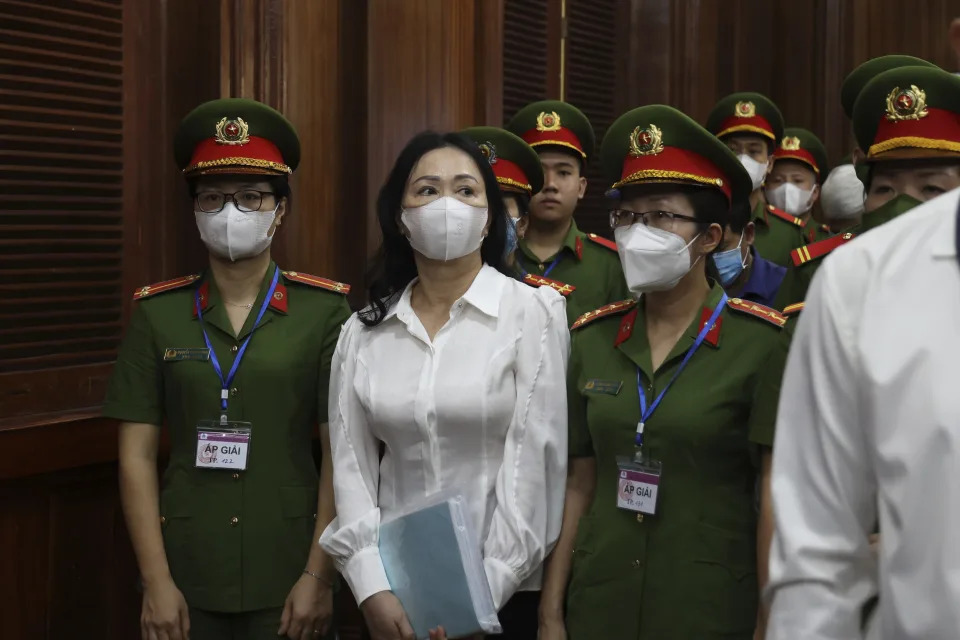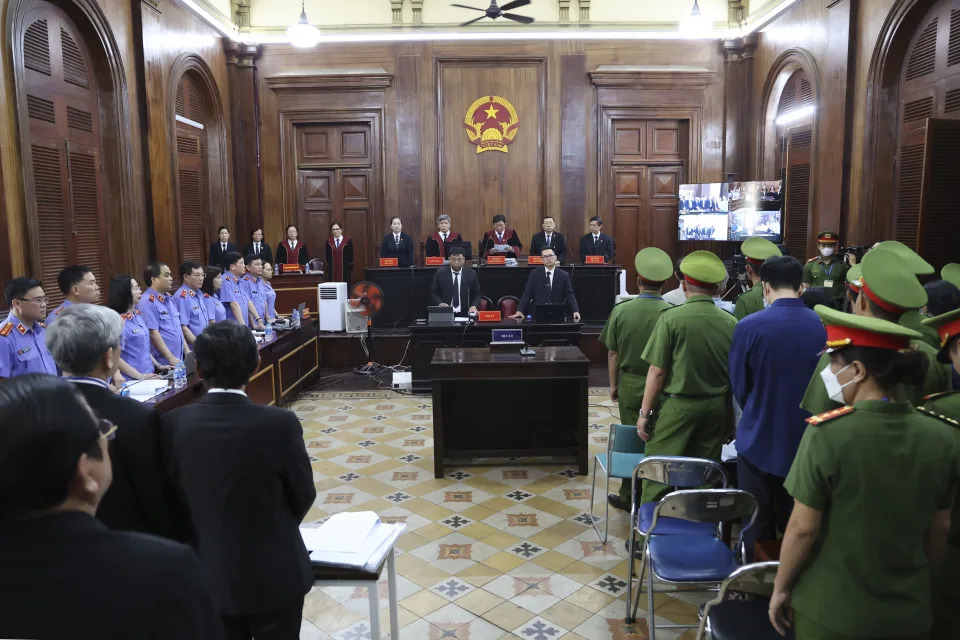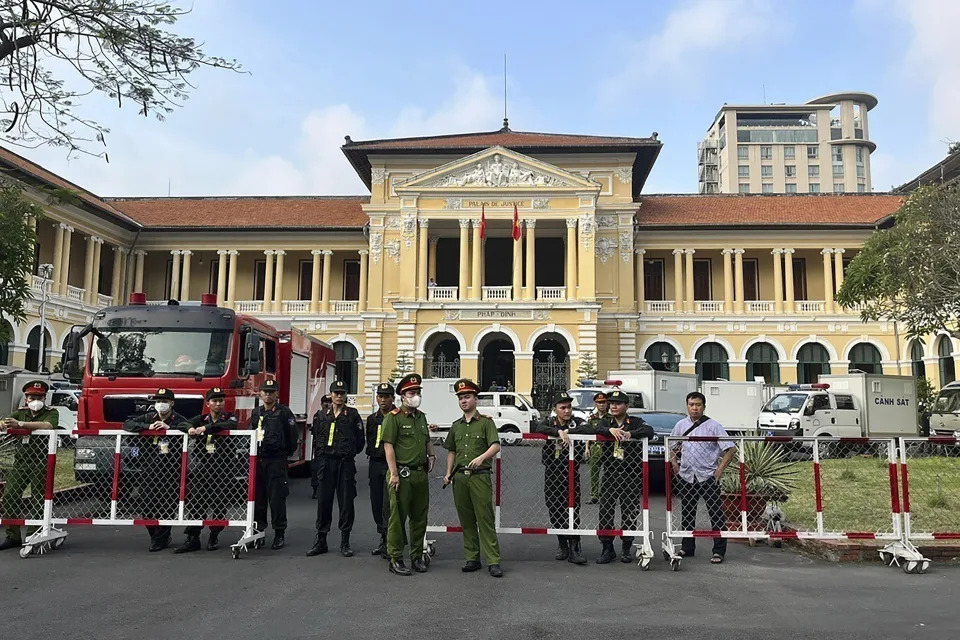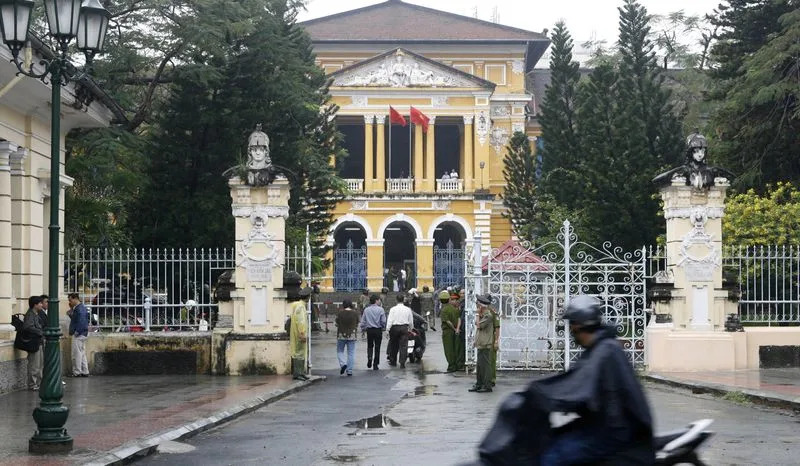A Vietnamese property tycoon accused of embezzling $12.5 billion begins her trial
ANIRUDDHA GHOSAL
Mon, March 4, 2024



Police guard the entrance to a courthouse in Ho Chi Minh City, Vietnam Tuesday, March 5, 2024, where Vietnamese businesswoman Truong My Lan stands trial. Lan faces the death penalty in a trial that began Tuesday over alleged fraud amounting to $12.5 billion, nearly 3% of the country’s 2022 GDP.
(Hoang Anh Tuan/VNA via AP)
ASSOCIATED PRESSMore
HANOI, Vietnam (AP) — Real estate tycoon Truong My Lan faces the death penalty in a trial that began Tuesday over alleged fraud amounting to $12.5 billion — nearly 3% of the country’s 2022 GDP and Vietnam's largest financial fraud case on record.
The 66-year-old chair of the real estate company Van Thinh Phat allegedly used “thousands of ghost companies,” paid bribes to government officials and violated banking regulations, according to a government document. She is accused of illegally controlling the Saigon Joint Stock Commercial Bank between 2012 to 2022 and using it to embezzle $12.5 billion, the document adds.
Another 85 people are being prosecuted in connection, including a former State Bank of Vietnam official accused of accepting $5.2 million in bribes. Lan was arrested in October 2022 and could get a death sentence if found guilty.
She was escorted to the court by the authorities at around 7 a.m. Her husband Eric Chu Nap-kee, who works in real estate in Hong Kong, was also summoned, state media VN Express reported. VTP was among Vietnam’s richest real estate firms and its projects include luxury residential buildings, offices, hotels and shopping centers.
Lan's arrest is among the most high-profile in an ongoing anti-corruption drive in Vietnam that gained momentum since 2022. The so-called Blazing Furnace campaign has seen thousands of officials and business executives come under investigation. It reached the highest echelons of the Vietnamese government in January 2023 with the resignation of former President Nguyen Xuan Phuc and two deputy prime ministers for the “political responsibility” of corruption scandals during the pandemic.
But analysts added the anti-corruption drive has also dampened Vietnam’s economic outlook and made foreign investors jittery at a time when the southeast Asian nation has been positioning itself as the ideal home for businesses looking to shift their supply chains away from China.
It’s the scale of Lan's alleged scam that has been surprising, said Linh Nguyen, the lead analyst for consultancy Control Risks. Lan is accused of disbursing $44 billion in loans to herself and her allies between 2012 to 2022, and the documents related to the case weigh 6 tons, according to VN Express.
“More than 3% of the GDP is very large,” Nguyen said, adding that it also raised questions about whether other banks and businesses had “done the same (and) just haven’t been discovered.”
The anti-corruption drive has also resulted in Vietnam's bureaucracy slowing down with “public officials becoming anxious about being investigated and shirking their responsibilities,” according to a report from Singapore’s ISEAS-Yusof Ishak Institute. The most glaring evidence of this has been in the slow spending rates for public investment. As of October 2023, a little over 55% of the annual budget had been spent with $10.19 billion needing to be disbursed within 35 days, state media Vietnam News reported. These are funds necessary for development projects — ranging from bridges to highways to airports — and not spending it in time results in long delays.
Nguyen said that investors — especially in banking, finance and real estate — are much more cautious now. “It's a more 'let us wait and see' with investors at the moment,” she said.
The real estate sector in Vietnam has been hit particularly hard — an estimated 1,300 property firms withdrew from the market in 2023, developers have been offering discounts and gold as gifts to attract buyers, and despite rent for shophouses falling by a third in Ho Chi Minh City, many in the city center are still empty, according to state media.
Poor global demand and slowing public investment meant that Vietnam’s economic growth slowed down to 5.05% last year, compared to 8.02% in 2022, according to government data.
In November, Communist Party General Secretary Nguyen Phu Trong, Vietnam's top politician, said that the anti-corruption fight would “continue for the long term.” Around that time, Vietnamese authorities said they were investigating two other cases linked to Lan's real estate companies that involved laundering money overseas through real estate
ASSOCIATED PRESSMore
HANOI, Vietnam (AP) — Real estate tycoon Truong My Lan faces the death penalty in a trial that began Tuesday over alleged fraud amounting to $12.5 billion — nearly 3% of the country’s 2022 GDP and Vietnam's largest financial fraud case on record.
The 66-year-old chair of the real estate company Van Thinh Phat allegedly used “thousands of ghost companies,” paid bribes to government officials and violated banking regulations, according to a government document. She is accused of illegally controlling the Saigon Joint Stock Commercial Bank between 2012 to 2022 and using it to embezzle $12.5 billion, the document adds.
Another 85 people are being prosecuted in connection, including a former State Bank of Vietnam official accused of accepting $5.2 million in bribes. Lan was arrested in October 2022 and could get a death sentence if found guilty.
She was escorted to the court by the authorities at around 7 a.m. Her husband Eric Chu Nap-kee, who works in real estate in Hong Kong, was also summoned, state media VN Express reported. VTP was among Vietnam’s richest real estate firms and its projects include luxury residential buildings, offices, hotels and shopping centers.
Lan's arrest is among the most high-profile in an ongoing anti-corruption drive in Vietnam that gained momentum since 2022. The so-called Blazing Furnace campaign has seen thousands of officials and business executives come under investigation. It reached the highest echelons of the Vietnamese government in January 2023 with the resignation of former President Nguyen Xuan Phuc and two deputy prime ministers for the “political responsibility” of corruption scandals during the pandemic.
But analysts added the anti-corruption drive has also dampened Vietnam’s economic outlook and made foreign investors jittery at a time when the southeast Asian nation has been positioning itself as the ideal home for businesses looking to shift their supply chains away from China.
It’s the scale of Lan's alleged scam that has been surprising, said Linh Nguyen, the lead analyst for consultancy Control Risks. Lan is accused of disbursing $44 billion in loans to herself and her allies between 2012 to 2022, and the documents related to the case weigh 6 tons, according to VN Express.
“More than 3% of the GDP is very large,” Nguyen said, adding that it also raised questions about whether other banks and businesses had “done the same (and) just haven’t been discovered.”
The anti-corruption drive has also resulted in Vietnam's bureaucracy slowing down with “public officials becoming anxious about being investigated and shirking their responsibilities,” according to a report from Singapore’s ISEAS-Yusof Ishak Institute. The most glaring evidence of this has been in the slow spending rates for public investment. As of October 2023, a little over 55% of the annual budget had been spent with $10.19 billion needing to be disbursed within 35 days, state media Vietnam News reported. These are funds necessary for development projects — ranging from bridges to highways to airports — and not spending it in time results in long delays.
Nguyen said that investors — especially in banking, finance and real estate — are much more cautious now. “It's a more 'let us wait and see' with investors at the moment,” she said.
The real estate sector in Vietnam has been hit particularly hard — an estimated 1,300 property firms withdrew from the market in 2023, developers have been offering discounts and gold as gifts to attract buyers, and despite rent for shophouses falling by a third in Ho Chi Minh City, many in the city center are still empty, according to state media.
Poor global demand and slowing public investment meant that Vietnam’s economic growth slowed down to 5.05% last year, compared to 8.02% in 2022, according to government data.
In November, Communist Party General Secretary Nguyen Phu Trong, Vietnam's top politician, said that the anti-corruption fight would “continue for the long term.” Around that time, Vietnamese authorities said they were investigating two other cases linked to Lan's real estate companies that involved laundering money overseas through real estate
Trial begins in Vietnam's largest, multi-billion-dollar financial fraud

A man rides a motorcycle past the People's Court in Ho Chi Minh city
By Francesco Guarascio
Updated Mon, March 4, 2024
HANOI (Reuters) - The trial in Vietnam's largest financial fraud case on record began on Tuesday, with nearly 90 defendants accused of being part of a $12 billion scam, for which some of them risk the death penalty.
The trial, expected to last until the end of April at the People's Court of Ho Chi Minh City, is part of a much wider campaign against corruption in the country which the leader of the ruling Communist Party, Nguyen Phu Trong, has pledged for years to stamp out, with no tangible results yet.
The anti-graft drive has led in recent months to multiple high-profile arrests and the resignation of top figures, including the country's former president last year, but the trial for the chairwoman of real estate developer Van Thinh Phat Holdings Group is unprecedented for its scale, with thousands expected to be summoned and about two hundred lawyers participating in the proceedings, according to state media.
Real estate tycoon Truong My Lan and her accomplices are accused of siphoning off 304 trillion dong ($12.46 billion) from the country's largest bank by assets, Saigon Joint Stock Commercial Bank (SCB), which Lan effectively controlled through dozens of proxies, according to investigators.
A lawyer for Lan declined comment.
If proved, it could be one of the largest financial frauds in Asia. Malaysia's 1MDB corruption scandal involved for instance only about $4.5 billion.
The start of the trial featured prominently in state media which showed pictures and footage of Lan and other defendants in the courtroom surrounded by dozens of police officers.
From early 2018 through October 2022, when SCB was bailed out by the state after a run on its deposits, Lan appropriated large sums by arranging unlawful loans to shell companies, according to public investigators.
Another $1.2 billion was lost by holders of bonds issued by Van Thinh Phat, Lan's real estate firm, according to the investigators.
Lan has for years been a central figure in Vietnam's finance and orchestrated the merger of SCB with other two lenders in 2011 to salvage the troubled banks in a plan coordinated with the central bank.
She owns several properties in Ho Chi Minh City's richest district and has multiple assets abroad, according to investigators and public information.
Top international auditors, including Ernst & Young and KPMG, did not raise any concern about the bank in their audits, public documents show. They did not reply to requests for comment.
WIDESPREAD CORRUPTION
In addition to charges of embezzlement, Lan is also accused of giving bribes and of breaching banking regulations. She risks the death penalty.
Among the other defendants are Lan's husband, a Chinese national, and 15 central bank officials, including a senior inspector accused of taking bribes worth $5.2 million from Lan.
Despite years of the anti-graft campaign, known locally as "blazing furnace", corruption remains widespread in the Southeast Asian country, leading many to question motives behind any arrest.
In some provinces, up to 90% of applicants for land certificates paid a bribe, and kickbacks are also extremely common to receive medical services in public hospitals, according to a report published in March 2023 by the United Nations Development Programme and other organisations.
"Bribe-taking amounts that would trigger citizens' denouncements ranged between 20 million dong ($810) and 43 million dong ($1,742), indicating citizens' levels of tolerance of bribe-taking acts," said the report, with the upper value being five times the average monthly salary in the country.
($1 = 24,675.0000 dong)
(Reporting by Francesco Guarascio; Editing by Raju Gopalakrishnan)
No comments:
Post a Comment